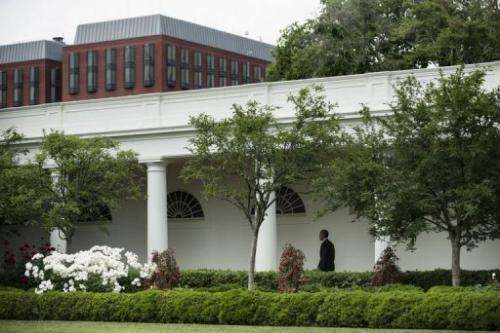White House moves to curb 'patent trolls' (Update 2)

The White House moved Tuesday to crack down on abuses of the patent system, responding to mounting concern among technology companies over a flood of litigation which some say stifles innovation.
The latest moves target so-called "patent trolls" which, according to the White House, "hijack" ideas and take other companies to court with an eye to collecting license or royalty fees.
President Barack Obama issued five executive orders and called for new legislation to update a reform enacted in 2011, a statement said.
"Innovators continue to face challenges from patent assertion entities... that, in the president's words 'don't actually produce anything themselves,' and instead develop a business model 'to essentially leverage and hijack somebody else's idea,'" the statement said.
White House top economic aide Gene Sperling said there has been "an explosion of abusive patent litigation" in recent years.
"In the last two years, the number of lawsuits brought by patent trolls has nearly tripled," Sperling said.
"The victims of patent trolls paid $29 billion in 2011, a 400 percent increase from 2005—not to mention tens of billions dollars more in lost shareholder value."
One of the signed orders calls for patent holders to have by default a "real party-in-interest" in a patent.
The order is aimed at creating more transparency by disclosing the true owners of patents and at preventing the use of secretive "shell companies" to hoard them.
The president also signed measures aimed at ensuring "overall patent quality" to reduce the number of vague or broad patents which can be used to sue inventors.
The move drew praise from many US technology lobbying groups.
The White House action will help in "reining in abusive patent litigation," said TechAmerica's Kevin Richards.
"With the bipartisan support this issue enjoys, those great minds who are creating the next disruptive technology in their basement or dorm room can look forward to a system that preserves their idea."
Gary Shapiro, president of the Consumer Electronics Association, also hailed the move, saying Obama's action "is on the side of innovation and job creation and against the spineless parasites of society who ruin American businesses."
The Internet Association said it "applauds the executive actions," adding: "We echo the president's call for legislation to put patent trolls out of business for good... patent trolls are nothing more than extortionists."
Julie Samuels at the Electronic Frontier Foundation called the actions "big news" which address "dangerous aspects of the patent troll business model."
Dennis Crouch, a University of Missouri patent law specialist, said the moves are generally "welcome and will benefit the patent system as a whole."
"In fact, this move to finally address the problem of predictability of patent scope and patent validity hits the sweet spot of where problems emerge in the system," Crouch said in a blog post.
"Of course, the devil will be in the details of these approaches."
But Robert Stoll, a Washington patent lawyer and former commissioner at the US Patent and Trademark Office, urged a more cautious approach.
"The people who say the patent system is broken have another agenda," Stoll said.
"The patent system is probably the best in the world, it is functioning. There could be some tweaks."
Stoll said even the definition of patent troll is vague, because some holders, including researchers or universities, may legitimately want to hold the patents without manufacturing or selling anything.
"We need to look at these issues carefully," Stoll said.
"We want to get rid of the bad actors but not the legitimate patent holders."
Matt Reid of BSA: The Software Alliance said some elements of the White House actions were "problematic."
"There is widespread agreement on the need to correct asymmetries in the patent system... but it is equally important not to undermine innovators' ability to protect their inventions," said Reid.
He added that singling out computer-enabled inventions "could inadvertently put at risk innovation for many industries that rely on software, from manufacturing to biotech."
© 2013 AFP


















